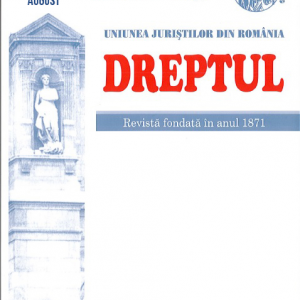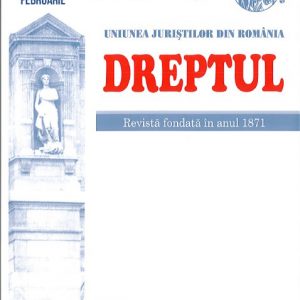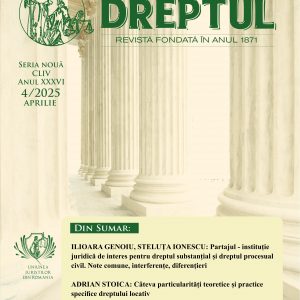-
 Durata de suspendare a exercitării dreptului de a conduce autovehicule în situația nepredării permisului de conducere începe să curgă de la expirarea perioadei de 15/30 zile și nu de la data rămânerii definitive a hotărârii civile sau de la data înștiințării efectuate de organele de poliție către inculpat în legătură cu această perioadă.
Durata de suspendare a exercitării dreptului de a conduce autovehicule în situația nepredării permisului de conducere începe să curgă de la expirarea perioadei de 15/30 zile și nu de la data rămânerii definitive a hotărârii civile sau de la data înștiințării efectuate de organele de poliție către inculpat în legătură cu această perioadă. -
 The succession of the criminal codes has created numerous transitory situations requiring a functional system of principles to be solved. In this context, the courts have provided different solutions to some aspects related to the application of the criminal law in time, thus generating a non-unitary practice. The main cause of these contradictions was represented by the modality of determination of the most favourable criminal law. Just when it seemed that the High Court of Cassation and Justice had clarified the misunderstandings, the Constitutional Court has pronounced the Decision No 265/2014 which completely changes the situation, offering an interpretation that does not find many followers among jurists.
The succession of the criminal codes has created numerous transitory situations requiring a functional system of principles to be solved. In this context, the courts have provided different solutions to some aspects related to the application of the criminal law in time, thus generating a non-unitary practice. The main cause of these contradictions was represented by the modality of determination of the most favourable criminal law. Just when it seemed that the High Court of Cassation and Justice had clarified the misunderstandings, the Constitutional Court has pronounced the Decision No 265/2014 which completely changes the situation, offering an interpretation that does not find many followers among jurists. -
 Based on provisions of art. 20 of the Romanian Constitution, republished, and considering the provisions of art. 5 para. 4 of the Convention on Human Rights and Fundamental Freedoms, the principle of equality of arms and related jurisprudence of the European Court of Human Rights (ECHR), the authors argue that both de lege lata, and in terms of the new Criminal Procedure Code, the detainee is in a position of net disadvantage to the prosecution represented by the prosecutor, since the defendant to whom, on the merits, the request for revocation of preventive detention or its replacement was rejected, it is not given the opportunity to effective remedy. Consequently, the authors make some suggestions de lege ferenda in order to regulate this situation in accordance with the provisions in Constitution and the ECHR jurisprudence.
Based on provisions of art. 20 of the Romanian Constitution, republished, and considering the provisions of art. 5 para. 4 of the Convention on Human Rights and Fundamental Freedoms, the principle of equality of arms and related jurisprudence of the European Court of Human Rights (ECHR), the authors argue that both de lege lata, and in terms of the new Criminal Procedure Code, the detainee is in a position of net disadvantage to the prosecution represented by the prosecutor, since the defendant to whom, on the merits, the request for revocation of preventive detention or its replacement was rejected, it is not given the opportunity to effective remedy. Consequently, the authors make some suggestions de lege ferenda in order to regulate this situation in accordance with the provisions in Constitution and the ECHR jurisprudence. -
 This paper aims to address some issues encountered in the control/audit activity that the Romanian Court of Accounts performs on public authorities and institutions, which aims the disputes arising from breaching by them of the provisions of Law no. 544/2001 on free access to public information. The law provides, in art. 22, that the person who considers himself injured in his rights may appeal to the legal administrative department in whose territorial jurisdiction is residing or the authority or public institution is situated, and the court may require the defendant authority to provide the requested information and pay moral and/or property damages. The defendant in this litigation is the territorial administrative unit (village, town, city, county), and the obligation to pay any compensation falls to it.
This paper aims to address some issues encountered in the control/audit activity that the Romanian Court of Accounts performs on public authorities and institutions, which aims the disputes arising from breaching by them of the provisions of Law no. 544/2001 on free access to public information. The law provides, in art. 22, that the person who considers himself injured in his rights may appeal to the legal administrative department in whose territorial jurisdiction is residing or the authority or public institution is situated, and the court may require the defendant authority to provide the requested information and pay moral and/or property damages. The defendant in this litigation is the territorial administrative unit (village, town, city, county), and the obligation to pay any compensation falls to it. -
 Within this article, the author makes an analysis of the main provisions of the Hague Convention of 1985 on the law applicable to trusts and on their recognition. In the context of introducing in the Romanian civil law the legal operation of fiducia, achieved by the provisions of Articles 773–791 of the Civil Code of 2009, Romania’s accession to the Hague Convention would be a natural step that the Romanian legislator should take in the near future. Although some of the provisions of the Hague Convention have been taken, tale quale, within the provisions of private international law relating to the fiducia, the accession to the Hague Convention and its introduction into the Romanian internal law, would lead to expanding the scope of practical application of the legal instrument of the fiducia itself.
Within this article, the author makes an analysis of the main provisions of the Hague Convention of 1985 on the law applicable to trusts and on their recognition. In the context of introducing in the Romanian civil law the legal operation of fiducia, achieved by the provisions of Articles 773–791 of the Civil Code of 2009, Romania’s accession to the Hague Convention would be a natural step that the Romanian legislator should take in the near future. Although some of the provisions of the Hague Convention have been taken, tale quale, within the provisions of private international law relating to the fiducia, the accession to the Hague Convention and its introduction into the Romanian internal law, would lead to expanding the scope of practical application of the legal instrument of the fiducia itself. -
 Although the legal doctrine has been less concerned with this subject matter, there are some papers elaborated under the influence of the previous regulations, however, there are quite a few recent papers. In this article, the author makes an analysis of the offences of this special regulation, preferring a classical approach of the subject, the structure being as follows: 1) a brief history of regulations in the field of fishing and aquaculture; 2) the analysis of the offences in terms of constitutive elements, but having in view that some elements are common to all offences, such as, for example, the legal object; these are analyzed by groups, in order to avoid repetition; 3) a few elements of comparative law, by exemplification of some incriminations in the specific legislation of other States.
Although the legal doctrine has been less concerned with this subject matter, there are some papers elaborated under the influence of the previous regulations, however, there are quite a few recent papers. In this article, the author makes an analysis of the offences of this special regulation, preferring a classical approach of the subject, the structure being as follows: 1) a brief history of regulations in the field of fishing and aquaculture; 2) the analysis of the offences in terms of constitutive elements, but having in view that some elements are common to all offences, such as, for example, the legal object; these are analyzed by groups, in order to avoid repetition; 3) a few elements of comparative law, by exemplification of some incriminations in the specific legislation of other States. -

-
 Asociația Internațională de Filosofie a Dreptului și Filosofie Socială (I.V.R.)1 a fost înființată în anul 1909 la Berlin, ca „Asociația Internațională pentru Filosofia Dreptului și Filosofie economică” și redenumită apoi, în 1933, „Asociația Internațională pentru Filosofia Dreptului și Filosofie socială”. I.V.R este cea mai veche, cea mai mare și importantă organizație în domeniul filosofiei dreptului și filosofiei sociale. Reorganizarea I.V.R. pe secțiuni naționale a fost decisă la Viena în 1959. Astăzi, I.V.R. are mai mult de 40 de asociații naționale membre (între care și asociația națională română), cu peste 2000 de membri în întreaga lume. Asociația este înregistrată, în temeiul legislației germane, și are sediul în Wiesbaden. Scopul său principal este de a sprijini și de a promova filosofia juridică și socială la nivel național și internațional. I.V.R. organizează congrese mondiale, la fiecare doi ani. Publicația oficială a I.V.R. este o revistă internațională, Archiv für Rechts-und Sozialphilosophie.
Asociația Internațională de Filosofie a Dreptului și Filosofie Socială (I.V.R.)1 a fost înființată în anul 1909 la Berlin, ca „Asociația Internațională pentru Filosofia Dreptului și Filosofie economică” și redenumită apoi, în 1933, „Asociația Internațională pentru Filosofia Dreptului și Filosofie socială”. I.V.R este cea mai veche, cea mai mare și importantă organizație în domeniul filosofiei dreptului și filosofiei sociale. Reorganizarea I.V.R. pe secțiuni naționale a fost decisă la Viena în 1959. Astăzi, I.V.R. are mai mult de 40 de asociații naționale membre (între care și asociația națională română), cu peste 2000 de membri în întreaga lume. Asociația este înregistrată, în temeiul legislației germane, și are sediul în Wiesbaden. Scopul său principal este de a sprijini și de a promova filosofia juridică și socială la nivel național și internațional. I.V.R. organizează congrese mondiale, la fiecare doi ani. Publicația oficială a I.V.R. este o revistă internațională, Archiv für Rechts-und Sozialphilosophie. -
 The Decision of the Constitutional Court of Romania No 405/2016, referring to the plea of unconstitutionality of the provisions of Article 246 of the Criminal Code of 1969, of Article 297 (1) of the Criminal Code and of Article 132 of the Law No 78/2000 on preventing, discovering and sanctioning of corruption acts (hereinafter referred to as „Decision No 405”)1, is not a mere interpretative decision2 whereby, following the admission of a plea of unconstitutionality, it is established that a text of law is constitutional only provided that a certain wording has a certain meaning3. The recitals of the Decision No 405, to which there have been added, shortly after, those included in the Decision No 392/2017, referring to the plea of unconstitutionality of the provisions of Article 248 of the Criminal Code of 1969, of Article 297 (1) of the Criminal Code and of Article 132 of the Law No 78/2000 on preventing, discovering and sanctioning of corruption acts4 (hereinafter referred to as „Decision No 392”), have emphasized the fact that the current rules of incrimination of the deeds of abuse of office, once clarified the meaning of the phrase „defectively fulfils”, still establish a criminal liability that rather acts with priority, and not according to ultima ratio principle, and the constitutive elements of the offence do not meet the standards of drafting of such legal norms identified in the case law of the European Court of Human Rights (hereinafter referred to as „ECHR”), the United Nations Convention against Corruption5, as well as in various reports and positions assumed by the European Union bodies on this subject. For the assumption that these observations of the Constitutional Court would determine the legislator to reflect on the necessity to reconfigure the legal provisions in question, the Court has indicated certain points of reference that should be considered in order to ensure a regulation compatible with the international and European standards mentioned.
The Decision of the Constitutional Court of Romania No 405/2016, referring to the plea of unconstitutionality of the provisions of Article 246 of the Criminal Code of 1969, of Article 297 (1) of the Criminal Code and of Article 132 of the Law No 78/2000 on preventing, discovering and sanctioning of corruption acts (hereinafter referred to as „Decision No 405”)1, is not a mere interpretative decision2 whereby, following the admission of a plea of unconstitutionality, it is established that a text of law is constitutional only provided that a certain wording has a certain meaning3. The recitals of the Decision No 405, to which there have been added, shortly after, those included in the Decision No 392/2017, referring to the plea of unconstitutionality of the provisions of Article 248 of the Criminal Code of 1969, of Article 297 (1) of the Criminal Code and of Article 132 of the Law No 78/2000 on preventing, discovering and sanctioning of corruption acts4 (hereinafter referred to as „Decision No 392”), have emphasized the fact that the current rules of incrimination of the deeds of abuse of office, once clarified the meaning of the phrase „defectively fulfils”, still establish a criminal liability that rather acts with priority, and not according to ultima ratio principle, and the constitutive elements of the offence do not meet the standards of drafting of such legal norms identified in the case law of the European Court of Human Rights (hereinafter referred to as „ECHR”), the United Nations Convention against Corruption5, as well as in various reports and positions assumed by the European Union bodies on this subject. For the assumption that these observations of the Constitutional Court would determine the legislator to reflect on the necessity to reconfigure the legal provisions in question, the Court has indicated certain points of reference that should be considered in order to ensure a regulation compatible with the international and European standards mentioned. -
 In this study, the author makes an analysis of the provisions of Article 2319 of the new Romanian Civil Code, which entered into force on 1 October 2011, a text according to which „the personal guarantee ceases to exist following the death of the personal guarantor, although there is a contrary stipulation”, in relation to the general rules of principle of the Civil Code regarding the death of a contracting party (the natural person), respectively the cessation of the capacity of use (in case of the legal person). It is mentioned that the solution regulated by Article 2319 of the Romanian Civil Code did not exist in the previous Romanian Civil Code (of 1864), being taken from the Civil Code of the Province of Québec (Canada).
In this study, the author makes an analysis of the provisions of Article 2319 of the new Romanian Civil Code, which entered into force on 1 October 2011, a text according to which „the personal guarantee ceases to exist following the death of the personal guarantor, although there is a contrary stipulation”, in relation to the general rules of principle of the Civil Code regarding the death of a contracting party (the natural person), respectively the cessation of the capacity of use (in case of the legal person). It is mentioned that the solution regulated by Article 2319 of the Romanian Civil Code did not exist in the previous Romanian Civil Code (of 1864), being taken from the Civil Code of the Province of Québec (Canada). -

-
 The present study aims mainly to identify those wordings in Law no. 287/ 2009 on the Civil Code which apply to testamentary inheritance issues that have certain shortcomings, and to find, as much as possible, the best solutions for remediation thereof.
The present study aims mainly to identify those wordings in Law no. 287/ 2009 on the Civil Code which apply to testamentary inheritance issues that have certain shortcomings, and to find, as much as possible, the best solutions for remediation thereof.
